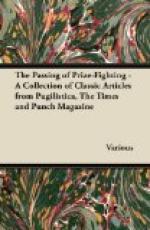* * * * *
[Illustration: “SEE THAT, SIR? ’FARM LABOURERS, MINIMUM TWENTY-FIVE SHILLINGS A WEEK.’ NOW, SIR, WOULD YOU ADVISE ME TO LEAVE MY PRESENT OCCUPATION AND TAKE UP FARM-WORK?”]
* * * * *
SERGE AKSAKOFF, a distinguished Russian writer of the first half of the nineteenth century, gave the world a portrait of his grandfather. It is now translated with a singular felicity by Mr. J.D. DUFF, under the title, A Russian Gentleman (ARNOLD), and I should like to say that I, who have suffered something from translations out of the Russian, have very rarely read one which ran with such plausible smoothness and gave so clear an impression of a charming original. STEFAN MIHAILOVITCH BAGROFF was reckoned a good sort and a just if rather uncompromising man. His character is drawn with faithful exactness and praised with simple filial appreciation. The foibles of this worthy patriarch, such as the dragging of his wife along the floor when he was excessively annoyed, so that she went with her head bound for a year thereafter, are excused on the ground of his general decency. And indeed he was a lovable old boy, and the simple and unselfconscious artistry with which the author develops his character, and that of his daughter-in-law, SOFYA NIKOLAYEVNA, delights the jaded literary palate. AKSAKOFF has a quite singular power of selecting just the incident, the phrase, the gesture, the feature of the landscape which make you exclaim with a start, “Why, I’m seeing and hearing all this!” It is such a book as an historian of the modern school would delight in, more engrossing than fiction of the most realistic type. There is incident in it too—as of the degenerate KUROLYESSOFF, a cousin-in-law of MIHAILOVITCH, who used to flog his serfs, sometimes to death, for the pleasure of seeing them suffer; while the opening pages, describing the trekking of the family out of far-eastern Orenburg into the adjoining province of Ufa, and the building of the mill and the dam, are astonishingly vivid and agreeable.
* * * * *




